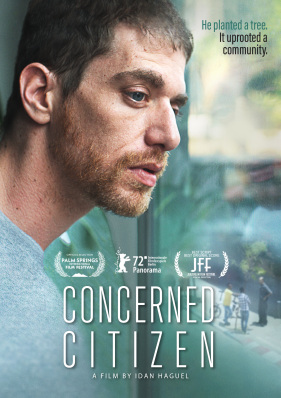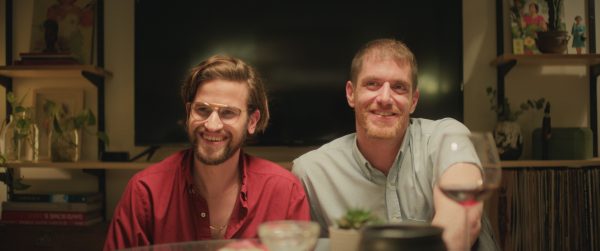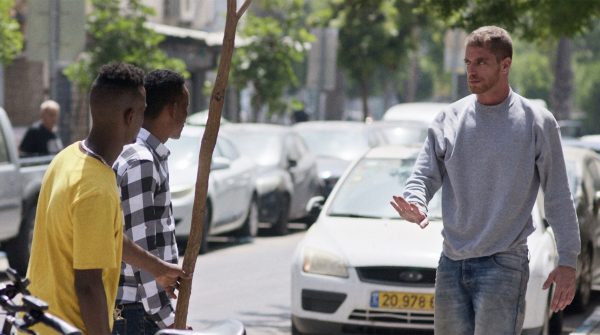‘Concerned Citizen’ urges us to seriously consider our social values

“Concerned Citizen” (“Ezrah Mudag”) (2022 production, 2023 release). Cast: Shlomi Bertonov, Ariel Wolf, Lena Fraifeld, Uriah Jablonowsky, Yshelu Gebremkiel, Ilan Hazan, Flora Bloch, Idan Hubel, Or Butbel, Yaeli Rozenblit, Aram Rabinovitch, Shahaf Ifhar, Meni Rapoprt, Ofer Amram. Director: Idan Haguel. Screenplay: Idan Haguel. Web site. Trailer.
There’s just one problem with this supposedly progressive attitude: It’s unclear how much the couple truly believes in what they’re saying or whether it’s just politically correct lip service. For starters, while Ben and Raz anticipate rising property values as the neighborhood transitions, just how much of the multicultural diversity that they so proudly brag about will be maintained in light of such a fundamental change? How realistic is it to believe that the low-income immigrant residents from places like Eritrea will continue to be able to afford living there? And what will happen to those supposedly good influences that they hope will rub off on their child?
But this issue doesn’t stop there, especially where Ben is concerned. He incessantly boasts about the many expressions of his modern, broadminded outlook, right down to the fact that he’s proudly serving as the sperm donor for the impending conception of the couple’s child. He further demonstrates his supposedly selfless civic mindedness by planting a young tree in a bare patch of soil adjacent to the streetscape outside his apartment building. He again takes great pride for his contribution, doing his part to make the neighborhood a more aesthetically pleasing place.

However, Ben’s spirit of good citizenship gets carried a little too far when he starts obsessing over his altruistic addition to the public landscape. So, one evening, while in his apartment, he witnesses a pair of local African teens leaning against his fragile sapling, prodding him to go outside and have a talk with them about their wholly inconsiderate behavior. Their somewhat indifferent response, in turn, prompts him to return inside and call authorities about the incident. And, before long, from the comfort of his residence, Ben watches in shock as a pair of cops comes along, brutally beating one of the alleged perpetrators for a crime of unmitigated, first degree leaning.
Ben is devastated by what he witnesses, but he’s not sure how to respond. The actions of the police go too far in his view, but what is he to do? He’s suddenly torn about his own supposedly liberal views. Has he been walking his talk all along, or has he been engaging in the aforementioned lip service? Do his actions at protecting his precious little tree represent a form of inherent White privilege that he hasn’t recognized or wanted to own up to about himself? And is he now feeling guilt and remorse in response to what happened when he acted upon feelings that he thought he didn’t possess?
Ben consequently experiences an existential crisis that expresses itself in myriad forms. He’s forced into asking himself some difficult questions, facing some troubling truths and examining some hard choices. For instance, in light of the police brutality, can he bring himself to notify officials responsible for investigating such incidents? But, if that were the case, wouldn’t that mean he’d have to admit calling authorities in advance of the attack, something that he as a supposed progressive would like to keep under wraps?
Then there’s the need to examine his reaction (or overreaction) to the teens’ behavior when they were leaning on his tree. Was it really such a bad thing? And is it symptomatic of another dirty little secret he’d like to keep buried – that he’s bought into his sense of White privilege more than he’d actually like to admit? After all, there are a number of scenes in the film where he’s seen speaking with neighbors and friends (Lena Fraifeld, Uriah Jablonowsky, Idan Hubel) about some of the “distasteful” and “troubling” activities going on in the neighborhood, such as crime, homelessness and the careless depositing of undisposed human excrement on the floor of his building’s lobby. He wonders whether he’ll be able to put up with such behavior for the long term, especially once he’s ready to start raising a child there (the alleged benefits of multicultural diversity notwithstanding). It’s a realization that even prompts him to consult a real estate agent (Or Butbul) about selling his apartment – without telling Raz.
Needless to say, such developments start putting a strain on Ben’s relationship, but answers continue to elude him, even in sessions with his therapist (Ilan Hazan). But, such indecisiveness aside, Ben feels he has to do something, like look for ways to practice what he’s been preaching all along. That thinking surfaces, for example, when visiting the gym one day, where he verbally (and nearly physically) takes on an arrogant, prejudiced bigot (Aram Rabinovitch) who repeatedly berates an African locker room attendant with unrelenting racial slurs. But do such chivalrous acts genuinely make up for what happened, what Ben didn’t do and who he really is?
A desire for creating surroundings that are nice, tidy and pleasant is certainly laudable, but what if that drive for pristine perfection goes south, with the emergence of unexpected circumstances and consequences that seriously undercut such intentions? This examination of gentrification and what’s really behind it certainly opens the eyes of both characters and viewers alike. The picture doesn’t intrinsically judge the practice of neighborhood transition, but it certainly forces us to look at the effects of it and the causes that brought them on in the first place. And, because of that, we might come away from it not liking what we see. It’s something to think about the next time a real estate deal one can’t refuse comes along.

So how does such a conundrum arise? It’s a product of the conscious creation process, the philosophy that maintains our thoughts, beliefs and intents shape the reality we experience, for better or worse. No one can say for certain how many of us are aware of or buy into such thinking, but, when we look at what emerges out of our consciousness and into physical existence, it’s difficult to deny a connection between the two.
It might seem a little strange that Ben secretly believes in things that he might otherwise readily deny, yet, as his experience illustrates, that’s clearly the case, whether or not he’s willing to admit it. But, if that’s indeed true, where did this enigmatic puzzle come from in the first place?
There could be several answers for this. For instance, Ben’s unacknowledged prejudices could well have developed in his youth, swayed by the thinking of those around him, such as older relatives or authority figures, ideas that he quietly but nevertheless subsequently embraced as his own. In doing so, he merely adopted them without thinking or questioning their appropriateness, tucking them away into his subconscious. Some might even say that these beliefs are part and parcel of White privilege, a likely product of his ethnic and socioeconomic upbringing. Granted, as he got older and learned about other perspectives, he may have gone along with those new notions but without having erased the old tapes in his mind when doing so. As a result, those old beliefs continued to hang around, not disappearing into oblivion and despite not having been tapped into for quite some time. But, as noted before, beliefs can be powerful and persistent forces, remaining quietly in place, even when we’ve thought they were gone.
Likewise, peer pressure to embrace new beliefs later in life may truly seem to have been strong enough to override whatever outmoded notions may have long been present, but that doesn’t guarantee such group think is sufficient to accomplish this. And that, in turn, is what accounts for the conundrum of seemingly disbelieving the old beliefs while still holding on to them. In this context, the new beliefs could be seen as something to pave over the old ones. But, no matter how much new metaphysical asphalt is applied, the underlying roadbed is still in place. Ben may freely agree outwardly with his open-minded peers, but deep down does he really believe what he’s saying? In a sense, this could be comparable to saying how much he, too, admires the emperor’s new outfit.

So how does one escape a situation like this? As far as Ben is concerned, he needs to be shocked into the realization of what his beliefs really are, particularly the inherent contradiction in what he claims to believe and what he actually does believe. And that often calls for the manifestation of some kind of eye-opening experience – in this case, the incident of police brutality and the role he played in bringing it about. Would Ben willingly seek to manifest something like that? Probably not. But might he unwittingly do so to expose the belief conflict residing in his consciousness, particularly in light of the many impending ramifications upcoming in his life? That, it seems, might be plausible.
If we genuinely wish to invoke meaningful, heartfelt change in our lives, sometimes we have to stir things up in our consciousness. That means undergoing experiences in which we seek to shake ourselves out of our own complacency, especially when it comes to our beliefs, given the central role they play in manifesting the reality we experience. And an incident like the one Ben experiences in which he subjects himself to an existential awakening is a good example of what this is all about.
Admittedly, getting used to a new outlook may take some doing. Given the newness of it all, though, there may be some missteps along the way (like not informing your partner that you’ve taken steps to sell your home to flee your circumstances), and there’s always the possibility of overcompensation (like nearly coming to blows with a bigot over his openly professed racial views). But these gaffes indicate that Ben is making progress toward rewriting his beliefs and letting go of those that no longer work, even if things don’t quite pan out as hoped for. But, hey, Rome wasn’t built in a day, and neither was Tel Aviv nor Ben’s consciousness.
The important point in all this is that at least an attempt is being made to examine what’s in place, what needs to change and the steps we can take to rectify matters. We might not even get things right in the attempt (or in multiple attempts, as anyone who has ever tried to lose weight or quit smoking can attest). However, it’s the effort that counts, and, for all his foibles, Ben appears to be trying his hand at it. Even if he’s not perfect at it, at least give the guy some credit already.
While the story in “Concerned Citizen” is somewhat light on plot, this wry satire nevertheless subtly but effectively addresses issues related to one’s personal character, authenticity and sense of integrity. True, writer-director Idan Haguel’s third feature outing probably could have benefitted from a more developed narrative, but its incisive look at what we say and what we actually do gives even the most self-righteous among us much to ponder, especially when it comes to walking our talk. We can learn a lot from the well-considered reflection this offering inspires, providing us a spot-on look at a question that we should all take more seriously from time to time. The film is available for streaming online.
Copyright © 2023, by Brent Marchant. All rights reserved.



